Russian cash-for-votes flows into Moldova as nation heads to polls
The sniffer dogs at Chisinau Airport have been working extra hard in recent months, searching for money that might be evidence of Russian meddling in Moldovan politics.
Ami, a black retriever, gives every suitcase that rolls in on the baggage claim belts a good sniff on all sides. If she detects cash, she will freeze. Back in May she was doing that a lot.
That is when customs officers began finding large amounts of money on passengers arriving via connecting flights from Moscow. People who had never left Moldova before were returning from a few days in Russia with wads of notes.
“Almost everyone had money: 2,000, 3,000, 7,000 euros”, the head of customs at Chisinau Airport, Ruslan Alexandrov, remembers. The amounts themselves were not illegal but the patterns were suspicious.
“There were certain flights: Moscow-Istanbul-Chisinau, Moscow-Yerevan-Chisinau,” the customs chief explains. “Normally people don’t come in with that much money. Not from Moscow.”
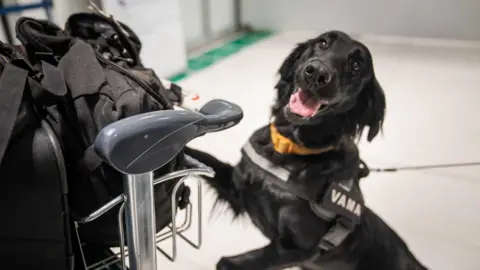 Matthew Goddard
Matthew GoddardSo police and prosecutors began seizing the cash. In one day alone they say they scooped $1.5m (£1.2m). No-one ever asked for their money back.
The authorities believe the cash mules were part of a major and ongoing operation to buy political influence run by a fugitive Moldovan oligarch named Ilan Shor. Convicted of major fraud in Chisinau, he is now resident in Russia which will not extradite him.
Ahead of two key votes this weekend, the capital’s airport is on alert. Flights from all “high risk” routes are met by sniffer dogs and at least half the passengers are pulled over for extra baggage scans.
On Sunday, President Maia Sandu is running for re-election on a staunchly pro-EU platform, challenged by 10 other candidates. Many are openly sympathetic to Moscow; some see Moldova as a “bridge”.
Voters will also get to cast their ballot in a referendum on whether to enshrine Moldova’s goal of EU accession in the constitution. In fact, membership talks have already begun but the country has been in a battle over its political direction for decades, ever since Moldova gained independence from Moscow as the Soviet Union fell apart.
That East-West tug has intensified since Russia’s full-scale invasion of Ukraine. President Sandu – a former World Bank economist first elected on a promise to clean up corruption – then steered Moldova much more sharply towards the West. She began to openly identify Vladimir Putin’s Russia as a major security threat.
The Kremlin denies playing any role in Chisinau politics, but officials here accuse Russia of operating via proxies to disrupt and destabilise the country.
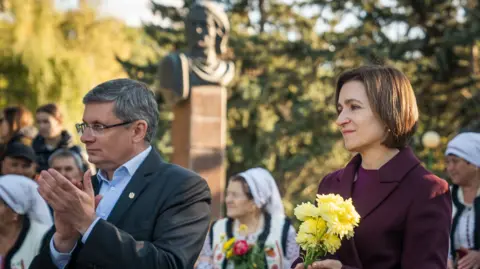 Matthew Goddard
Matthew Goddard“I’m not aware of anywhere else where we’ve seen such a brazen and open attempt to corrupt an election,” Moldova’s chief anti-corruption prosecutor, Veronica Dragalin, told me this week in her office in Chisinau.
Born in Moldova, she spent most of her life in the US – most recently as a prosecutor in Los Angeles – before returning to the country and a job in a small office on the fifth floor of a Soviet-era block with a broken lift.
What her team say they have uncovered, working with police, is a pyramid payments scheme openly run from Russia by Ilan Shor and his group.
“We’re talking about a foreign country sending money in an attempt to influence the election,” Ms Dragalin spells it out. She details evidence gained through wiretaps, police infiltrators and witnesses – some of which her office has made public.
“At the start they tried to make it look legitimate. Now it’s almost like they’re flagrantly flaunting all the laws… [and] openly influencing the decision to vote,” the prosecutor says.
“The primary goal is to have the referendum fail.”
According to her team, once the cash couriers were detected at the airport and that route made more difficult, payments began to be channelled via a sanctioned Russian bank, PSB.
By early October as many as 130,000 voters had received payment through this scheme – about 10% of the active electorate, according to Viorel Cernauteanu, the chief of police.
“In September alone, $15m (£12m) was transferred,” he told me, explaining how they could trace funds and recipients because they gave personal data to open a bank account.
Offering money or goods in return for votes is a crime with a possible five-year jail sentence. Last month, a new law made it an administrative offence to accept money, too.
But in one of Europe’s poorest countries it is not hard to find willing recipients of cash.
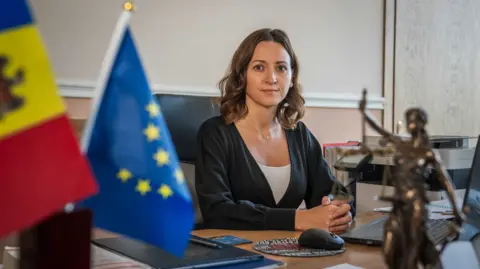 Matthew Goddard
Matthew GoddardMoldovan investigators admit they cannot identify the source of funds paid into PSB bank – whether it is Russian state money, private capital or the cash Ilan Shor was convicted of stealing in Moldova.
But he himself is very open about his actions and aims.
In a typical recent post on TikTok, Shor called for a “firm NO” to the EU. He then urged followers to choose “the president I decide on, as someone I can work with”.
In return he promised monthly top-up payments of 5,000 Moldovan lei to pensioners, or about £200.
Shor fled Moldova in 2019 and was later sentenced in absentia for money laundering and embezzlement. Last year, his party was banned and he is also under Western sanctions, accused of “malign influence campaigns” for Russia.
Media companies linked to him, Telegram channels and various political groupings have all been blocked. But his message – anti-EU, sympathetic to Moscow – still seeps through.
Some remain receptive to that, as well as the cash.
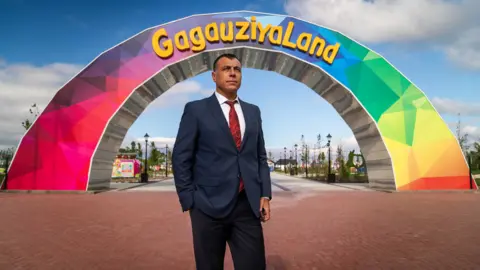 Matthew Goddard
Matthew GoddardIlya Uzun is one big fan.
The deputy governor of Gagauzia, a small autonomous region of southern Moldova, also happens to respect Russian President Vladimir Putin. He tells me that is because he likes strong leaders who he thinks “put their country first”.
Russia’s war on neighbouring Ukraine changed nothing on that score.
He admires former US President Donald Trump for the same reason, whilst his scorn for the EU – which recently placed him under sanctions for “destabilising activities” – mainly focuses on LGBT rights, which he opposes virulently.
Later, when I ask passers-by in the regional capital Comrat about the EU referendum, several reply that they’ll vote “no” in order to keep “gay parades” from their town.
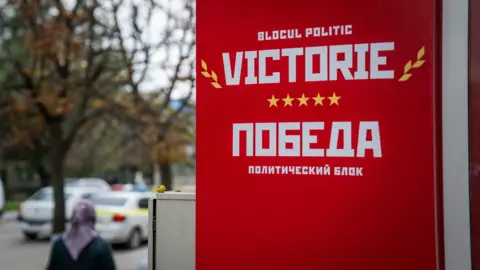 Matthew Goddard
Matthew GoddardPro-Russian views and Kremlin-led narratives have always been strong in Gagauzia, where many still watch Russian state TV channels despite a national ban.
Lately, Shor has been investing heavily here. The deputy governor repeatedly refers to him as “our political leader” and shrugs off the criminal conviction as if it were political.
“Try and say a bad word here about Ilan Shor and people will spit at you!”, Uzun declares as we drive down Lenin Street past a statue of the Russian revolutionary, a little grubby but still intact.
Many shop signs, those not in the local Gagauz language, are in Russian.
I hear how Shor pays top-up pensions to 30,000 people in the region as well as re-tarmacking some 50 km (31 miles) of roads between remote villages, which we see.
“All he does is for the people,” Uzun enthuses.
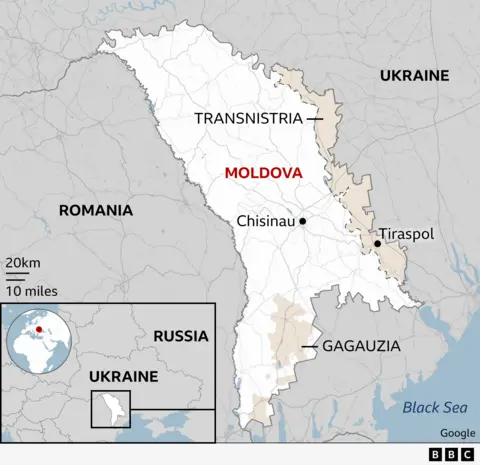
The anti-corruption prosecutor later clarifies that using donations for social spending is not a crime. But channelling Shor’s funds to political parties is an offence – and Uzun’s boss, regional governor Evghenia Gutul, has been charged with that.
After a while we roll up to a children’s fairground.
“Look at Gagauziyaland, it’s beautiful!” Uzun beams, leading the way beneath a giant rainbow into a deserted but brand-new park.
 Matthew Goddard
Matthew Goddard
The wind is bitterly cold and the mini dragon roller-coaster and merry-go-round we are looking at both stand empty and still. But Uzun insists people in Gagauzia will vote “how Shor tells them” – not for money, but because they trust him.
“All the talk, that he’s an arm of the Kremlin, destabilising Moldova: that’s absolutely not true. This is the truth: what you see here,” he waves towards the frozen fairground.
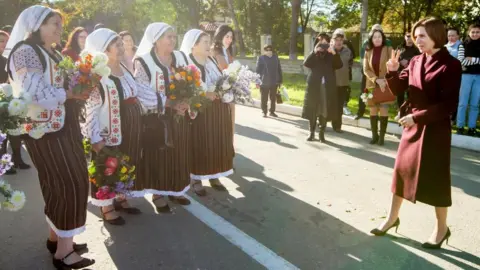 EPA
EPAOn Friday, Moldova’s election campaign reached its climax.
Maia Sandu was met for her own final rally in the small town of Telenesti, where women in traditional dress sang and supporters clapped as she passed.
She has not taken part in election debates and did not want to speak to the BBC. But addressing a couple of hundred people through a microphone, Sandu urged Moldovans to vote for her and for the EU as the best path to peace.
“This has been a very difficult campaign with a lot of lies and dirty money,” she told them, asking voters to “put our country out of harm’s way” and prevent her opponents “derailing Moldova from its European path”.
That path has been a bumpy one for many years, with multiple diversions. Still, Moldova had already made its choice and opened accession talks with the EU.
Now a referendum that Sandu initiated in an attempt to reinforce that goal and bolster her own support has turned into a risky political move.
It looks like the presidential ballot is not the only vote she has to worry about on Sunday.



